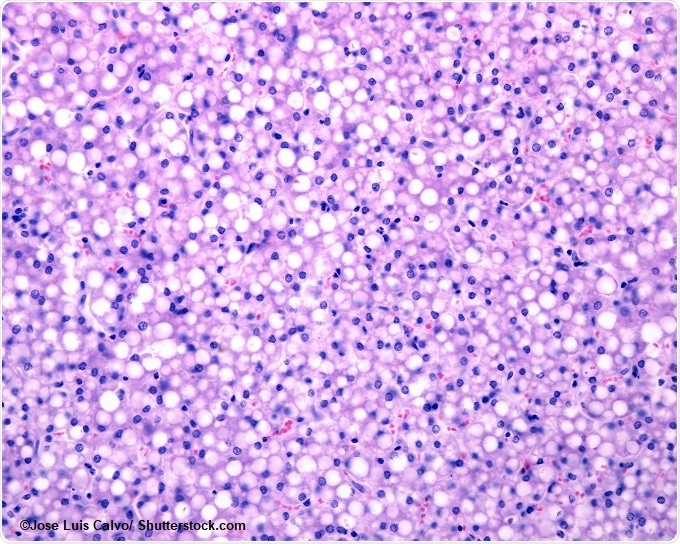Proteins are an important component of our diet and help to build muscles; they take part in the structure of hormones and they are vital to the whole body’s metabolism.
What liver damage does a low protein diet cause and why does this occur? How does the damage to the liver impact its ability to function properly?
The most important consequence is that the liver loses its capacity to produce proteins (such as albumin) and to metabolise (inactivate or activate in some cases) medicaments for instance.
Another consequence could be the accumulation of fat in the liver cells which is called steatosis.

In your recent research, what method did you use to measure liver damage?
We used 3D Design-based Stereology which is a very innovative methodology that allows us to sample and count biological structures such as cells, vessels, bones using a 3D approach.
What impact on the liver did the low protein diet in mice have?
It leads to accumulation of fat in the liver cells (hepatocytes) and this is called steatosis. In addition, it causes atrophy (reduction in size) of the liver as a whole and atrophy of liver cells (hepatocytes).
It also leads to an increase in the number of binucleate hepatocytes (liver cells with two nuclei) in an attempt to regenerate the liver under protein malnutrition.
Did you find the damage to be reversible?
Yes, when we reinstated a normoproteinic diet to those mice, the damage to the liver was totally reversed.
Were you surprised by the findings?
Yes, since it was the first study to try to renourish the animals with the correct amount of protein after a hypoproteinic diet was given to the same animals for 5 weeks.
Also, our study was the first to use Stereology to assess whether correcting the amount of protein in the diet would actually reverse the damage caused by a previous low protein diet.
Do you think this would hold true in humans?
It is very likely that it would be the case in humans and we believe that our study has a strong translational character.
What further research is needed to understand the impact of low protein diets on the liver?
We hypothesize that new studies combining molecular biology and Stereology should focus on what type of liver cell (hepatocyte) is mostly affected by a low protein diet.
Where can readers find more information?
The full article can be found on: http://www.nutritionjrnl.com/article/S0899-9007(17)30042-4/fulltext
About Dr. Augusto Coppi
 Augusto Coppi has a degree in Veterinary Medicine and Animal Science obtained in São Paulo (Brazil) and is an Anatomist and Stereologist with a Master's degree, PhD and post-doctorates specifically in Animal Anatomy.
Augusto Coppi has a degree in Veterinary Medicine and Animal Science obtained in São Paulo (Brazil) and is an Anatomist and Stereologist with a Master's degree, PhD and post-doctorates specifically in Animal Anatomy.
He has 22 years of experience in teaching a wide range of Veterinary Anatomy segments: Living, Clinical, Surgical, Comparative, Sectional, Developmental, Topographical, Functional, Imaging and 3D Anatomy - from mammals and birds to exotic animals - and coordinates a plethora of Veterinary Anatomy education projects. Augusto is also involved in training other national and overseas academics.
He also teaches an extensive catalogue of current available methods for learning Veterinary Anatomy, including dissection, vascular injection, perfusion-fixation and Imaging Anatomy.
Augusto also organises and teaches - nationally and abroad - a wide range of 3D Quantitative Microscopy courses focusing on Design-based Stereology applied to research projects where state-of-the-art 3D Quantitative Microscopy is needed.
Please use the following link to get a biography and a picture from me: https://www.surrey.ac.uk/